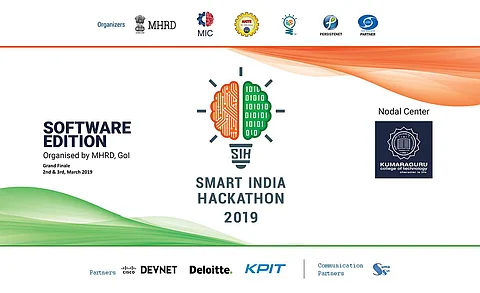

A team from Ramrao Adik Institute of Technology, Mumbai has won the first prize in the Smart India Hackathon 2019. The first runners up in the competition was Karpagam College of Engineering, Coimbatore, Tamil Nadu and the second runners up was Zakir Husain College of Engineering& Technology, Aligarh Muslim University(AMU), UP.
The Smart India Hackathon 2019 was held at the IIT Kanpur from July 8 to 12 and the results were announced on Friday night. The winner's Subterranean Rescuers team of Ramrao Adik Institute of Technology, Mumbai, which won Rs one lakh in cash was led by Ajit Mutalik which used robotics and drones for underground coal mine mapping system.
The team, in its project report, said coal has many important uses worldwide and used majorly in India for the generation of electricity, production of steel, cement manufacturing and as a liquid fuel. "On the contrary, mining has the distinction of being the most dangerous profession in India. In many mining accidents, miners accidentally dug out the part connected to the river bed which in turn caused flooding throughout the mine. The main reason for these accidents is the lack of availability of accurate 2D and 3D maps of a coal mine.
The mine mapping problem is challenging because inside the underground mine we don't have any global position information.
So traditional technique of mapping cannot be used. ''To tackle this problem we propose a robotic system that can explore and construct 2D and 3D volumetric maps of the mine.
To construct these maps and to localize itself in the environment our system uses the approach of simultaneous localization and mapping or SLAM. The generated 3D volumetric maps can be used by the site engineers for surveying and plan mining in a more planned manner," the winning team said while making the presentation.
The first runners up, teamed named Collective Challengers of Karpagam college of engineering Coimbatore, Tamil Nadu, led by Ammu J Shajan, who have won Rs 75,000 cash, showcased on Healthcare and Biomedical devices with a title Smart helmet and health care monitoring system. The team has introduced a smart helmet with tracking facilities.
"When the patient faces an accident it sends the location to the ambulance. The patient can be either the bike rider or the person who is in emergency condition calls the ambulance. Once the patient enters the ambulance body parameters are measured and sent to the cloud. These data are analyzed using machine learning framework. Emergency administration plays a major role in finding specialised doctors in nearby areas based on the analyzed result.
The doctor views the result through a mobile app and makes up the setup of the emergency ward before the patient arrives at the hospital," the team claimed. The second runners-up, the Emoneers team of Zakir Husain College of Engineering and Technology of AMU was led by Priyanka Gupta which also showcased their project on health care and biomedical device for visually impaired people.
"According to a recent survey, of the 37 million blind people across the globe, 15 million of them belong to India. What is worse, 75 per cent of these cases are of avoidable blindness.
So there is a major need for improvement in the condition of visually impaired as per India is concerned. In the community of visually challenged people, obstacle detection is a hard and assistive job. The proposition of the Electronic Walking Stick(EWS) will help the user in obstacle detection.
The EWS will help the user in various other jobs like water detection, an indication to other people of the user in dark/less illuminated regions, etc," the team claimed.
